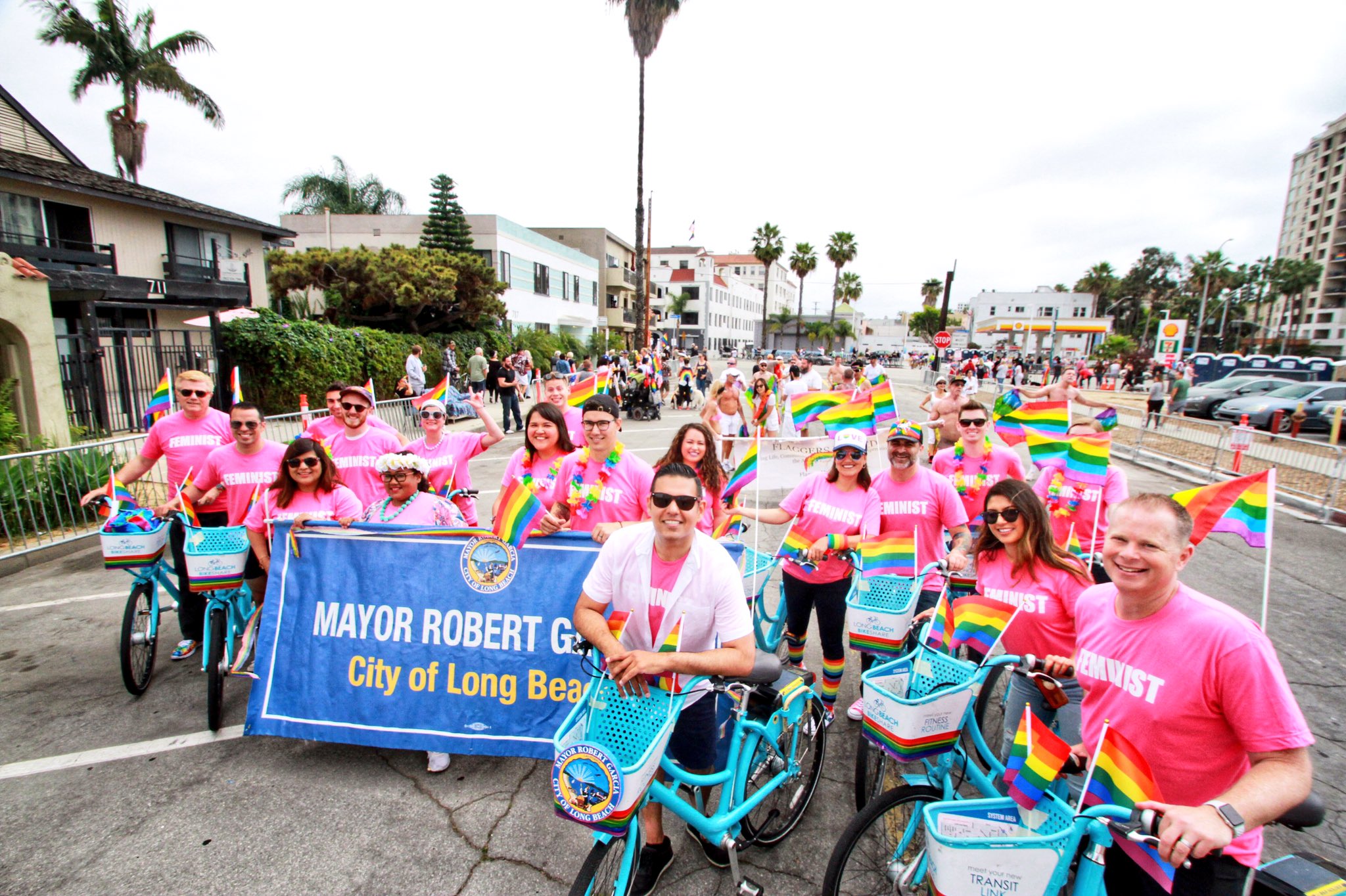PERSPECTIVE: To Support the Queer Community, Garcia Must Get out of Bed with the Police
9 minute readThe views expressed in this article do not necessarily reflect the views of FORTHE Media.
The convergence of the Black Lives Matter movement and Pride Month offers a moment of reflection for the queer community and a call to action for the mayor to defund the police. This article is the first in a two-part series.
A HISTORY OF HARASSMENT
In August 2017, Long Beach Police Department officers arrested and detained Sophia Larios, a transgender woman. While in custody at the Long Beach City Jail, Larios says officers groped, harassed, and purposefully misgendered her.
Queer people of color, especially transgender folks, face the brunt of police brutality. According to the National Center for Transgender Equality’s 2015 survey, one in five transgender folks who had contact with the police reported harassment. However, of the Black transgender folks surveyed, 38% reported police harassment.
For Larios, these statistics reflect the reality of her experience with the LBPD. As she told the Long Beach Press-Telegram in 2019, “I felt my rights as a transwoman were violated.” The public will have to wait and see how her case against the city unfolds, but for Larios, the damage has been done.
Some consider Long Beach a haven for the queer community. However, Larios’ case should not be surprising. The LBPD has a long history of oppressing the city’s queer community.
For centuries, the police have had the power to enforce gender standards through the policing of people’s dress, and punish queer sexuality through the enforcement of sodomy and lewd conduct laws. Police harassment of the queer community is so entrenched in the LBPD that, historically, the city’s police department became a model for entrapment of queer people.
The year 1914 was known in Long Beach for the “social vagrant” investigations. The LBPD hired two men, W. H. “Billy” Warren and B.C. Brown, to target and entrap gay men. In November 1914, LBPD officers arrested 31 men during raids on various social clubs, where queer folks congregated and sometimes dressed in drag.
The book Gay L. A.: A History of Sexual Outlaws, Power Politics, And Lipstick Lesbians highlights how the news sensationalized the story, unleashing “a tsunami of homophobia.” Newspapers labelled those arrested as “social vagrants” and “perverted.” Some papers published the names of each person arrested in an act of public shaming. This public outing led one man, a prominent Long Beach banker, to become so distraught that he committed suicide.
Warren and Brown continued to entrap queer folks, incentivized by the $10 bounty they received for each person they arrested for “social vagrancy.” The officers went on to offer their anti-queer services to Los Angeles, Venice, and Santa Monica. Exploiting the queer community became a business. Long Beach, for example, collected over $5,000 in fines from the November arrests alone, or over $100,000 today, after adjusting for inflation.
The 1914 incidences of police harassment highlight the police’s role in surveilling, punishing, and exploiting behavior that challenged heteronormativity. According to Gay L.A., Warren and Brown’s methods set a model for police across the country to harass gay communities. Even so, the threat of entrapment did not stop queer folks from community building and sexual expression, but the police state effectively drove their visibility underground.
The societal changes brought by the Sixties galvanized the community to challenge the police state. In 1968, a year before the Stonewall Riots, Los Angeles police targeted a gay bar called The Patch, then located in nearby Wilmington. Police tried to ban drag and male camaraderie, at one point arresting two men because one had slapped the other’s butt. But patrons fought back. Long Beach resident Lee Glaze, who owned the bar, helped stage a flower power protest outside an LAPD police station demanding the two men’s release.
In the decades that have followed, the queer community has won basic rights. The progress made leads some to complacency. Often, injustices of the past are highlighted in order to contrast the gains of the present. But as the Black Lives Matter movement shows us, the community is not in a place to stop and rest yet. For starters, police harassment continues.
A full century after the 1914 “social vagrant” investigations, the Long Beach Police Department arrested Rory Moroney in 2014 for lewd conduct in an undercover sting operation. Moroney sued. His lawyer, Stephanie Loftin, argued the main issue was false arrest. Since cops, in cases like these, instigate the invitation for the arrestee to show their genitals, it can’t be argued that they would then take offence. Two years later, the Long Beach courts granted their first ever motion for dismissal based on discriminatory enforcement. LA County Superior Court Judge Halim Dhanidina found that local police intentionally targeted men who have sex with men, which amounted to unlawful discrimination.
Tomisin Oluwole
Fragmented Reflection I, 2021
Acrylic on canvas panel
24 x 30 inches
Click here to check out our interview with Tomisin Oluwole, a literary and visual artist based in Long Beach.

Instead of gunking up our site with ads, we use this space to display and promote the work of local artists.
Loftin had been fighting lewd conduct arrests for decades and found a disturbing pattern of facts: There was never an onlooker other than a cop, and the person arrested was always male. Once taken to the precinct, those arrested would take the opportunity to plead out to disturbing the peace and be let go with a fine.
The LBPD was notorious for this practice. When Loftin started defending gay clients in the 1990s, she could see the hurt these arrests caused. “People were so traumatized, so I helped create a support group at The Center for men who had been arrested for lewd conduct,” she remembers. After getting the group up and running, she was tipped off that the LBPD had sent an undercover cop into the group to see what the group was saying, and so the group ended.
Spying on the very gay men they preyed on only reveals how important this practice was to the LBPD. For the police, as Loftin points out, “It’s a great gig, because you have crime, a 100% solve rate, and just about a 100% conviction rate because no one wants to fight it.” According to Loftin, after paying a fine plus penalties, assessment, and a booking fee, clients often paid close to $1,000. The courts and the police profited from trapping gay men with false arrests, and while the queer community suffered, officers in vice got promotions for pumping up their statistics.
Dhanidina’s 2016 ruling was historic as no other prior cases had been dismissed for discriminatory law enforcement. In fact, Long Beach stood out as one of the few cities left in California that continued to use undercover cops to ensnare gay men for lewd conduct. When it comes to this law enforcement procedure, the LBPD wrote the playbook and held on to it tightly, longer than most cities, despite Long Beach’s reputation as queer-friendly.
The LBPD has said they will review their policies and procedures. However, their long history of entrapping and harassing the queer community necessitates action stronger than mere reform. As it stands, the LBPD’s existence is antithetical to full liberation for the queer community and cannot be known as friends of the queer community without radical change to the department.
THE MAYOR’S HAND
On a sunny day you may notice a glint of light coming from Long Beach Mayor Robert Garcia’s right ring finger, where a platinum band rests. In 2018, he married his longtime partner Matt Mendez in a ceremony the local press highly publicized. His marriage came three years after the U.S. Supreme Court legalized gay marriage.
While Garcia benefited from the court’s decision in his personal life, the Black Lives Matter movement calls into question the allies in his political life. Since 2015, he has received over half a million dollars from the Long Beach Police Officers Association.
Garcia’s ties to the police complicate his openly gay identity. He has spoken of receiving homophobic slurs while walking on the street and receiving a cold shoulder from homophobic voters while campaigning. Yet, he is complicit in the city’s harassment of his own community by continuing to receive donations from the LBPOA and allowing the police department to receive 48% of the city’s general services funds. In contrast, city libraries receive 2.9%. Imagine all the community groups for Black and queer youth that the new Billie Jean King Main Library could foster with a larger percent of the pie.
Many in the queer community, specifically the White queer community, are starting to realize how anti-Black racism permeates into queer spaces. Uncritical support for the police department is just one example. Many queer people of color have known about inequity in the community for their whole lives because they have lived it. In contrast, some White queer people continue to perpetuate anti-Black racism through words and actions in their own bars, social groups, or Grindr profiles. As Christopher Street West’s handling of a solidarity march in Los Angeles shows, sometimes White queers’ realization is painfully slow.
On Sunday, Black Lives Matter Los Angeles will hold a march called All Black Lives Matter, forcing the issue of Black queer visibility on West Hollywood’s predominantly White and male gay population. The All Black Lives Matter march in Los Angeles leads me to wonder: as Black Lives Matter Long Beach moves to organize a march to commemorate the Stonewall Riots later this month, will they invite Garcia?
Probably not. To befriend the police, receive money from the police, and overfund the police is to stand in direct opposition to the spirit of the riots. To secure his entry, Garcia would have to return his police donations and commit to defunding the LBPD. These actions would show he stands with the community, not against it.
For inspiration, Garcia should consider the bravery and strength that fueled Marsha “Pay it no mind” Johnson, Stormé DeLarverie, and Zazu Nova to fight back against the police during the Stonewall Riots, igniting a fight that led to, among other things, the mayor’s ability to marry his partner.
After a century of profiting off the queer community, the LBPD clearly does not serve to protect it. Garcia has a hand in how the city moves forward. His actions to return his police donations and commit to defunding the police would require only an ounce of the bravery and strength that Johnson, DeLarverie, and Nova showed. Unfortunately, I don’t think Garcia has it.


 lilyhodges@gmail.com
lilyhodges@gmail.com




